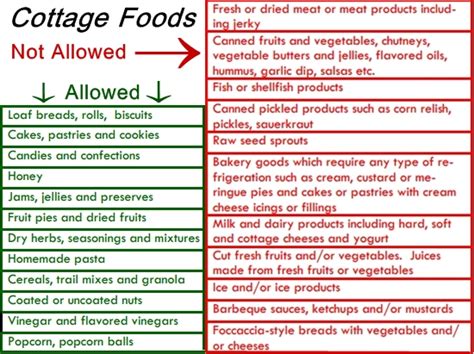In the state of Florida, the Cottage Law, also known as the Cottage Food Law, is a set of regulations that allows individuals to produce and sell certain low-risk, homemade foods, such as baked goods, jams, and honey, without having to obtain a full food establishment permit. This law is designed to support small-scale, home-based food entrepreneurs and help them get started in the food industry.
The Cottage Law in Florida was enacted in 2011 and has undergone several amendments since then. The law allows individuals to operate a cottage food operation, which is defined as a food operation that is conducted in a private home or a farm, and that has an annual gross sales of $50,000 or less. To qualify as a cottage food operation, the business must also meet certain requirements, such as:
- The business must be operated by an individual, not a corporation or partnership
- The business must be operated out of a private home or a farm
- The business must produce only low-risk, non-hazardous foods, such as baked goods, jams, honey, and certain types of candies
- The business must have an annual gross sales of $50,000 or less
- The business must comply with all applicable laws and regulations, including labeling and packaging requirements
Some of the benefits of the Cottage Law in Florida include:
- Reduced regulatory burden: Cottage food operations are exempt from many of the regulations that apply to larger food establishments, such as the requirement to have a commercial kitchen or to obtain a food service permit.
- Increased flexibility: Cottage food operations can operate out of a private home or a farm, and can sell their products directly to consumers, either in person or online.
- Support for small-scale food entrepreneurs: The Cottage Law is designed to support small-scale, home-based food entrepreneurs, and can help them get started in the food industry.
However, there are also some limitations and challenges associated with the Cottage Law in Florida, such as:
- Limited sales: Cottage food operations are limited to $50,000 in annual gross sales, which can make it difficult for businesses to scale up and grow.
- Limited products: Cottage food operations are only allowed to produce certain types of low-risk, non-hazardous foods, which can limit the range of products that can be sold.
- Labeling and packaging requirements: Cottage food operations must comply with labeling and packaging requirements, which can be time-consuming and costly to implement.
To start a cottage food operation in Florida, individuals must follow these steps:
- Check the eligibility of the product: Ensure that the product you want to sell is eligible under the Cottage Law.
- Complete a food safety training course: Complete a food safety training course, such as the one offered by the Florida Department of Agriculture and Consumer Services.
- Label and package the product: Label and package the product according to the requirements of the Cottage Law.
- Obtain any necessary local permits: Obtain any necessary local permits or licenses to operate the business.
- Comply with all applicable laws and regulations: Comply with all applicable laws and regulations, including those related to taxes, employment, and environmental health.
Some examples of products that can be sold under the Cottage Law in Florida include:
- Baked goods: Such as bread, cakes, cookies, and pastries
- Jams and jellies: Made from fruits, vegetables, and other ingredients
- Honey: Raw, unfiltered honey that is produced in Florida
- Candies: Such as caramels, toffees, and other types of sweets
- Spices and seasonings: Blends of spices and seasonings that are made from ingredients that are safe for human consumption
In conclusion, the Cottage Law in Florida provides an opportunity for small-scale, home-based food entrepreneurs to start and grow a business, while also ensuring that the products sold are safe for human consumption. By understanding the requirements and limitations of the Cottage Law, individuals can successfully operate a cottage food operation and sell their products to consumers.
FAQs
What types of products can be sold under the Cottage Law in Florida?
+Under the Cottage Law in Florida, individuals can sell low-risk, non-hazardous foods, such as baked goods, jams, honey, and certain types of candies.
Do I need to obtain a food service permit to operate a cottage food operation in Florida?
+No, cottage food operations are exempt from the requirement to obtain a food service permit, as long as they meet the requirements of the Cottage Law.
Can I sell my products online under the Cottage Law in Florida?
+Yes, cottage food operations can sell their products online, as long as they comply with all applicable laws and regulations, including those related to labeling and packaging.
How do I label and package my products under the Cottage Law in Florida?
+Cottage food operations must label and package their products according to the requirements of the Cottage Law, which includes including the name and address of the business, the name of the product, and a statement indicating that the product was made in a cottage food operation.
Can I operate a cottage food operation out of a commercial kitchen in Florida?
+No, cottage food operations must be operated out of a private home or a farm, and cannot be operated out of a commercial kitchen.


